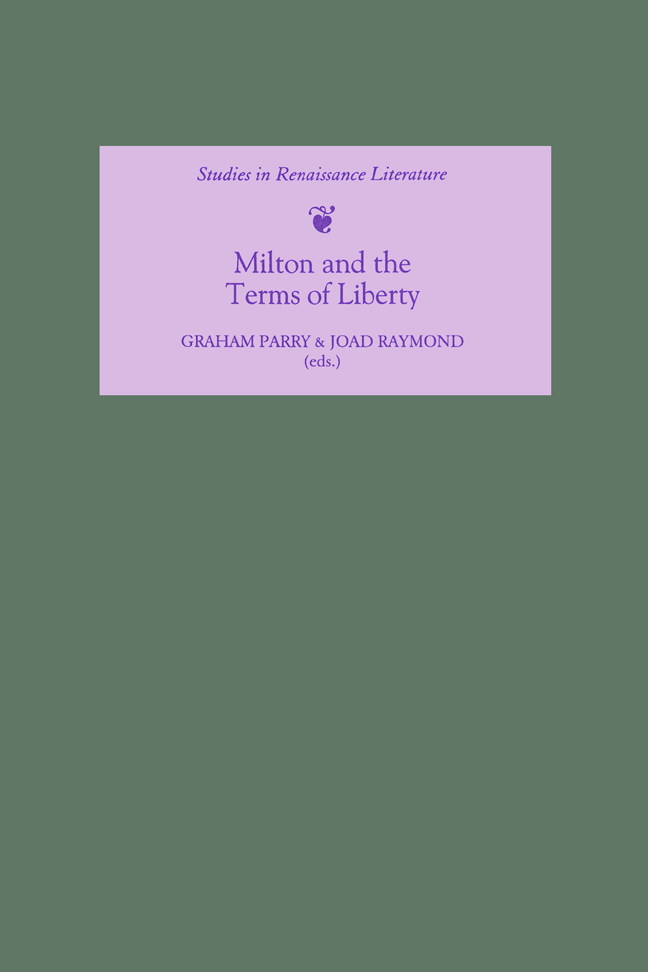Book contents
- Frontmatter
- Contents
- Contributors
- Acknowledgements
- Introduction
- 1 John Milton and the Politics of Slavery
- 2 Milton before ‘Lycidas'
- 3 Prosody and Liberty in Milton and Marvell
- 4 'In These Western Parts of the Empire': Milton and Roman Law
- 5 The King is a Thing
- 6 'in time of Warre … our Language is all corrupt with military Tearms': The Politics of Martial Metaphors in Post-regicide England
- 7 Alexander More Reads Milton: Self-representation and Anxiety in Milton's Defences
- 8 Stylometry and the Provenance of De doctrina christiana
- 9 The Figure and the Ground: Samson as a Hero of London Nonconformity, 1662-1667
- 10 The Publication of the King's Privacy: Paradise Regained and Of True Religion in Restoration England
- 11 'To try, and teach the erring Soul': Milton's Last Seven Years
- 12 Pandemonic Panoramas: Surveying Milton's ‘vain empires’ in the Long Eighteenth Century
- Index
- Studies in Renaissance Literature
Introduction
Published online by Cambridge University Press: 15 February 2024
- Frontmatter
- Contents
- Contributors
- Acknowledgements
- Introduction
- 1 John Milton and the Politics of Slavery
- 2 Milton before ‘Lycidas'
- 3 Prosody and Liberty in Milton and Marvell
- 4 'In These Western Parts of the Empire': Milton and Roman Law
- 5 The King is a Thing
- 6 'in time of Warre … our Language is all corrupt with military Tearms': The Politics of Martial Metaphors in Post-regicide England
- 7 Alexander More Reads Milton: Self-representation and Anxiety in Milton's Defences
- 8 Stylometry and the Provenance of De doctrina christiana
- 9 The Figure and the Ground: Samson as a Hero of London Nonconformity, 1662-1667
- 10 The Publication of the King's Privacy: Paradise Regained and Of True Religion in Restoration England
- 11 'To try, and teach the erring Soul': Milton's Last Seven Years
- 12 Pandemonic Panoramas: Surveying Milton's ‘vain empires’ in the Long Eighteenth Century
- Index
- Studies in Renaissance Literature
Summary
Every three or four years the International Milton Symposium assembles to discuss the current state of Milton studies, providing an occasion for scholars from all continents to meet and reaffirm the enduring importance of Milton to our understanding of the progress of poetry and politics during the most radical period of Britain's history. The Sixth Symposium met at York in July 1999. Milton never visited York – though an adventurous traveller abroad, he was reluctant to view his own country, and felt little need to leave the metropolis – but the prominence of York in the events of the Civil War made it an appropriate setting for a conference permeated by a consciousness of the political strife of the mid-seventeenth century. York was the centre of the King's government in the north. It was from York in April 1642 that King Charles marched to seize the strategic port of Hull, which resisted his entry and so made him aware for the first time that his authority could not prevail in his own kingdom. York remained the great royalist stronghold in the north until it was besieged in May 1644 by the armies of Sir Thomas Fairfax, the Earl of Manchester and the Scots under Lord Leven. The siege was raised by the arrival of Prince Rupert's army, but in the consequent confrontation at Marston Moor on 2 July 1644, the royalist armies of Rupert and Newcastle were comprehensively beaten by the Parliamentarians, who now had the decisive advantage of Oliver Cromwell's presence, and York fell to the victors. Royalist control of the north was lost for good. Fairfax prevented the pillage of York by the parliamentary armies, and he forbade the soldiers to touch the cathedral upon pain of death, thus preserving its monuments and stained glass from iconoclastic attack. York was the home of Fairfax, whose great townhouse was the principal private dwelling in the city, a few miles away from his country estate at Nun Appleton. Soon to become one of the parliamentary leaders most admired by Milton, his abilities became fully recognised when he was appointed Commander-in-chief of the New Model Army in 1645. Milton, like Andrew Marvell, had hopes that Fairfax would become the chief instrument in the creation of a just settlement after the end of the wars, for his integrity, ‘his firm unshaken virtue', shone out in the later years of the 1640s.
- Type
- Chapter
- Information
- Milton and the Terms of Liberty , pp. xi - xviPublisher: Boydell & BrewerPrint publication year: 2002

